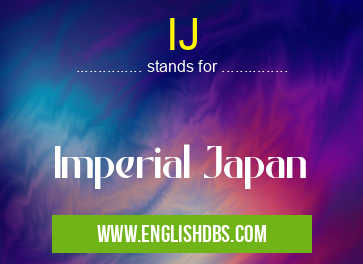What does IJ mean in ASIAN
IJ is an abbreviation that stands for Imperial Japan. It is often used in historical contexts to refer to the Empire of Japan during the period from 1868 to 1945.

IJ meaning in Asian in International
IJ mostly used in an acronym Asian in Category International that means Imperial Japan
Shorthand: IJ,
Full Form: Imperial Japan
For more information of "Imperial Japan", see the section below.
» International » Asian
Meaning in INTERNATIONAL
The term "IJ" is primarily used in English and has the same meaning in most international contexts. It is recognized as an abbreviation for Imperial Japan, especially in historical discussions and documents.
Full Form
Full Form: Imperial Japan
What Does IJ Stand For
- I: Imperial
- J: Japan
Essential Questions and Answers on Imperial Japan in "INTERNATIONAL»ASIAN"
What was Imperial Japan?
Imperial Japan (IJ) refers to the period of Japanese history from the Meiji Restoration in 1868 to the end of World War II in 1945. During this time, Japan underwent rapid industrialization and modernization, becoming a major world power and expanding its empire in East Asia and the Pacific.
What were the major characteristics of Imperial Japan?
Imperial Japan was characterized by:
- Militarism: The military played a dominant role in politics and society, with a strong emphasis on national defense and expansion.
- Ultranationalism: A strong sense of Japanese superiority and a belief in the divine mission of the emperor.
- Shintoism: A state-sponsored religion that emphasized loyalty to the emperor and the nation.
- Industrialization: Rapid economic growth and the development of a modern industrial base.
- Imperialism: The acquisition and control of overseas territories, including Korea, Taiwan, and parts of China.
What were the causes of Imperial Japan's rise to power?
The factors that contributed to Imperial Japan's rise to power include:
- Meiji Restoration: The Meiji Restoration in 1868 marked the beginning of Japan's modernization and the establishment of a centralized government.
- Industrialization: Japan rapidly industrialized, adopting Western technology and methods to develop its economy.
- Military reforms: The Japanese military was reorganized and modernized, adopting advanced weapons and tactics.
- Alliances: Japan formed alliances with Western powers, such as the Anglo-Japanese Alliance in 1902, which provided diplomatic support.
- Economic expansion: Japan's growing economy fueled its desire for overseas territories and resources.
What were the major events of Imperial Japan's history?
Significant events in Imperial Japan's history include:
- Russo-Japanese War (1904-1905): Japan's victory over Russia established it as a major world power.
- World War I (1914-1918): Japan joined the Allies and expanded its influence in Asia.
- Manchurian Incident (1931): Japan's invasion of Manchuria led to the creation of the puppet state of Manchukuo.
- Sino-Japanese War (1937-1945): Japan's full-scale invasion of China, which resulted in widespread atrocities.
- World War II (1939-1945): Japan's alliance with Nazi Germany led it to attack Pearl Harbor, bringing it into conflict with the United States and its allies.
- Atomic bombings of Hiroshima and Nagasaki (1945): The U.S. atomic bombings of these cities played a major role in Japan's surrender.
Final Words: The abbreviation "IJ" is a widely accepted shorthand for Imperial Japan. It serves as a concise way to refer to the Japanese empire during the period from 1868 to 1945. In international contexts, "IJ" maintains its meaning and is understood by historians, researchers, and individuals interested in Japanese history.
